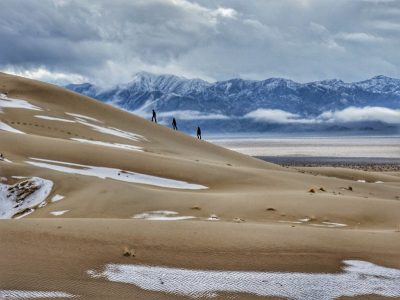Final Defense Bill Denies Military Request to Expand Nevada Bombing Ranges
Multiyear Campaign Stops Massive Public Land Seizure

Congress today moved to deny the Defense Department’s request to seize more than 1.7 million acres of public land in Nevada for bombing ranges, following a five-year grassroots campaign by public lands advocates to stop the land grab.
The Air Force’s proposal to seize 1.1 million acres of the Desert National Wildlife Refuge, the largest refuge in the lower 48 states, drew widespread condemnation from across Nevada and the nation. A similar Navy proposal to seize 600,000 acres of land in central Nevada was criticized by Nevada conservationists and indigenous tribes.
Both proposals were blocked in today’s final conference committee report for the annual defense policy bill, the 2021 National Defense Authorization Act.
“This is a monumental victory for public lands, wildlife and the people of Nevada,” said Patrick Donnelly, Nevada state director at the Center for Biological Diversity, which helped lead the coalition opposing the proposed land grabs. “We were told we had to cut a deal or risk losing everything. But this coalition showed steely resolve and it paid off. Our public lands have been saved from military seizure.”
More than 32,000 people submitted comments to the Air Force opposing the Desert refuge takeover. In 2019 the Nevada state legislature passed near-unanimous resolutions opposing both land grabs, led by Assemblywoman Lesley Cohen, Sen. Melanie Scheible, Assemblyman Howard Watts III and Assemblywoman Sarah Peters.
“We want to recognize the leadership of Nevada Assembly members Cohen, Watts and Peters, state Sen. Scheible and U.S. Rep. Horsford,” said Donnelly. “These elected officials went above and beyond the call of duty, responded to their constituents’ demands and took a bold stand for our public lands. We owe them a debt of gratitude.”
Tribal leadership was central to the campaign to save Nevada’s public lands, which are the ancestral heritage of Nevada’s tribal nations. The Moapa Band of Paiutes, Las Vegas Band of Paiutes, Fallon Paiute-Shoshone Tribe, the Intertribal Council of Nevada and the National Congress of American Indians passed resolutions opposing the land seizures and made numerous trips to Washington, D.C., to lobby Congress.
“Nevada’s Native American nations played a crucial role in securing this victory,” said Donnelly. “Their determined advocacy for their ancestral lands was decisive in achieving this outcome.”
This summer Rep. Rob Bishop (R-UT) successfully amended the Act to give the military almost 1 million acres of the Desert National Wildlife Refuge. Nevada’s Democratic House delegation, led by Rep. Steven Horsford, shot down the Bishop amendment and the wildlife refuge gained a temporary reprieve.
In today’s final report, the conference committee encouraged the Defense Department to “continue to work with the committees of jurisdiction, the Nevada congressional delegation, state and tribal stakeholders to secure a mutually-agreed upon expansion.”
“We know the military will be back and the coalition will be ready to protect our public lands,” said Donnelly. “When this campaign began we said ‘not one acre.’ We meant it.”
*
Note to readers: please click the share buttons above or below. Forward this article to your email lists. Crosspost on your blog site, internet forums. etc.
Featured image: Desert National Wildlife Refuge. Photo by Patrick Donnelly, Center for Biological Diversity Image is available for media use.

